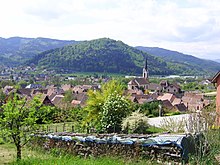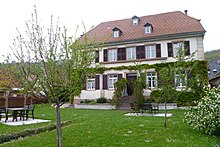Gunsbach
| Gunsbach | ||
|---|---|---|

|
|
|
| region | Grand Est | |
| Department | Haut-Rhin | |
| Arrondissement | Colmar-Ribeauvillé | |
| Canton | Wintzenheim | |
| Community association | Vallée de Munster | |
| Coordinates | 48 ° 3 ' N , 7 ° 11' E | |
| height | 326-985 m | |
| surface | 6.18 km 2 | |
| Residents | 907 (January 1, 2017) | |
| Population density | 147 inhabitants / km 2 | |
| Post Code | 68140 | |
| INSEE code | 68117 | |
| Website | http://www.gunsbach.fr/ | |
 Mairie Gunsbach |
||
Gunsbach ( Günsbach , Alsatian Ginschbe ) is a French commune in Alsace with 907 inhabitants (as of January 1, 2017) in the Haut-Rhin department in the Grand Est region . It belongs to the arrondissement of Colmar-Ribeauvillé in the canton of Wintzenheim and to the municipal association of the Münstertal (French: Vallée de Munster ).
geography
The municipality of Gunsbach is located about 16 kilometers southwest of Colmar in the Fecht Valley , also known as Vallée de Munster (German: Münstertal). The municipality is part of the Ballons des Vosges Regional Nature Park .
history
From 1871 until the end of the First World War , Gunsbach belonged to the German Empire as part of the realm of Alsace-Lorraine and was assigned to the Colmar district in the Upper Alsace district .
Population development
| year | 1910 | 1962 | 1968 | 1975 | 1982 | 1990 | 1999 | 2007 | 2017 |
| Residents | 784 | 630 | 633 | 650 | 702 | 709 | 789 | 916 | 907 |
economy
Industry has mainly settled on the western side of the village .
traffic
The main road D417 from Colmar to Munster runs south of the village center .
With Griesbach-au-Val , the village shares a station of the SNCF - Route Colmar-Metzeral which lies between the two towns.
Culture
The place is the seat of the international Albert Schweitzer Foundation (AISL). The house that Schweitzer had built in 1928/1929 is now a museum and archive on the life's work of the Nobel Prize winner. A library has been set up in the house opposite where Schweitzer's brother lived. The former parsonage, where Schweitzer spent his youth, is now a rentable meeting place. In the town hall there is - in the former classroom - a small "Africa Museum", where arts and crafts and customs from the area around Lambaréné are shown; this material was collected by Emma Haussknecht, a long-time employee of Schweitzer.
Personalities
Albert Schweitzer grew up in Gunsbach. His father, Ludwig Schweitzer, was a pastor there.
Others

Albert Schweitzer began playing the church organ in Gunsbach at the age of eight. In 1931 a new organ , made according to his specifications, was built into the church as a model for a village organ that could meet all the requirements placed on such an instrument. Since this instrument was badly damaged in World War II , it was rebuilt in 1961, which was also based on Schweitzer's information . A memorial concert has been held annually since 1971 on the anniversary of Schweitzer's death.
The Albert-Schweitzer-Weg is a tour through the village that follows in the footsteps of Schweitzer with the help of 16 information boards.
literature
- Le Patrimoine des Communes du Haut-Rhin . Volume 2. Flohic Editions, Paris 1998, ISBN 2-84234-036-1 , pp. 881-884.
Web links
Individual evidence
- ^ Dictionary of Alsatian dialects
- ^ Colmar district. Municipal directory Germany 1900
- ↑ Gite de groupe Albert Schweitzer. Retrieved April 20, 2017 (French).



